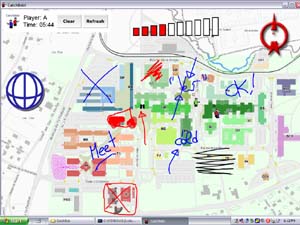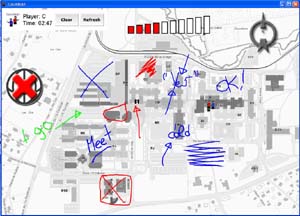Posted: November 23rd, 2004 | No Comments »
A rant about the division between the academic and technical world in social computing. On the academic/technical divide in social computing:
“The two communities—developers at ETCon and academic researchers as CSCW—are interested in very much the same things, but they’re both quite sure that the “other” group either won’t understand them or won’t care about their views. So they operate in parallel with few points of intersection, duplicating efforts and losing valuable inputs into their work.”
with a clear view on the use of a blog:
“Blogs are not only personal diaries—that they’re also powerful tools for information sharing, knowledge management, and social/professional network development.”
Posted: November 23rd, 2004 | No Comments »
Cheap thoughts on franglish about the tech-etiquette in the classroom, since I had to report on it today…
The tech-etiquette: Along with the technology comes a new set of rules, both written and unwritten, for decent behavior. Now, a classroomm etiquette should also include a tech-etiquette.
Le manque de tech-etiquette s’accrue dans le monde du travail.
In a recent Robert Half Technology survey, 67% of chief information officers polled said breaches in technology etiquette are more common today than three years ago.
Tech-etiquette’ blunders more common
LES PROBLEMES
- a laptop clearly represents an intervention in the classroom; thus classroom etiquette may change.
- Instabilité initiale des élèves (Elle est naturelle, mais ne dure pas)
- enregistrement à fond perdu du travail, la page est parfois considérée comme virtuelle et plus jamais utilisée.
- Etudiants de deconnectant du moment: chat/surf personnel effréné
LES SOLUTIONS
Quel type de charte/règlement?
Sur l’utilisation
* L’utilisation des ordinateurs portables a pour objet exclusif de mener de actes d’enseignement ou de documentation. Sauf autorisation préalable ou convention signée par le/les coordonateur(s) du projet, ces moyens ne peuvent être utilisés en vue de réaliser des projets ne relevant pas des missions confiées aux utilisateurs.
* Use laptops for taking notes, conducting research required for activities, and other specific classroom tasks as assigned by the instructor. During class, students should not check e-mail, browse the Internet, instant message, play games, or perform other off-task activities.
Le respect des autres
* Students may take notes on laptop computers in class unless members of the class complain that the noise of the computer is disruptive.
* If you bring a laptop/notebook computer to class, sit in the back of the room so that your typing does not disturb anybody.
Le respect du professeur
* Check with your professors as their preferences and guidelines for your laptop use within their class. This will vary from professor to professor and from class to class.
* ménager des temps de liberté : contrat moral
NOUVEAUX COMPORTEMENT INDUITS
Le multi-tasking est-il vraiment inefficace?
http://www.hci.cornell.edu/LabArticles/Multitasking_Hembrooke.pdf
Le “backchanneling” est utilisé maintenant lors de conférence.
Backchannel refers to making the crowd chatter public, the idea that the students or audience can discuss during a lecture in a way that becomes part of the shared intellectual space.
http://www.corante.com/many/archives/2004/11/11/on_the_academictechnical_divide_in_social_computing.php
http://www.smartmobs.com/archive/2004/10/30/backchannels.html
Posted: November 22nd, 2004 | No Comments »
Filesystem Hierarchy Standard is a set of requirements and guidelines for file and directory placement under UNIX-like operating systems. The guidelines are intended to support interoperability of applications, system administration tools, development tools, and scripts as well as greater uniformity of documentation for these systems
Posted: November 19th, 2004 | No Comments »
In Irland lebt es sich am besten. Die Schweiz liegt auf Rang Zwei bezüglich der Lebensqualität. Die Lebensqualität bewertete der “Economist” unter anderem aufgrund des Pro-Kopf-Einkommens, der Gesundheit, Scheidungsraten, Klima, politischer Stabilität, Sicherheit und Gleichberechtigung von Mann und Frau. The Economist, The World in 2005.
Posted: November 18th, 2004 | Comments Off
Video (10MB) of the fade out, refresh and connectivity effects on the CatchBob! interface.
Posted: November 18th, 2004 | No Comments »
From Java Development on MacOSX Pretty “Swell” to Me:
“I think a most sensible choice in terms of tools selection is to pick ones that are “OS neutral.” That is, tools that are essentially the same, no matter what OS you run. jEdit, Eclipse, vi, emacs, Google, Firefox all fall under that category. It’s important because it means you won’t have to learn new tools if for some reason you have to work on a different OS.“
Posted: November 17th, 2004 | No Comments »
Russel Beatie about the The Mobile Web: “How many people do you know who watch TV with a laptop using WiFi? Can I have a show of hands?”
Posted: November 17th, 2004 | No Comments »
Perfect piece of Java code to take screenshots during experiments on CatchBob! From Take a screenshot and save it to a PNG file using javax.imageio.
// determine current screen size
Toolkit toolkit = Toolkit.getDefaultToolkit();
Dimension screenSize = toolkit.getScreenSize();
Rectangle screenRect = new Rectangle(screenSize);
// create screen shot
Robot robot = new Robot();
BufferedImage image = robot.createScreenCapture(screenRect);
// save captured image to PNG file
ImageIO.write(image, “png”, new File(outFileName));
Posted: November 17th, 2004 | Comments Off
Screenshot of the CatchBob! latest release.

Player A connected

Player C temporally lost his connection
Posted: November 11th, 2004 | Comments Off
Welkin visualizes RDF models and currently supports only the RDF/XML syntax.



